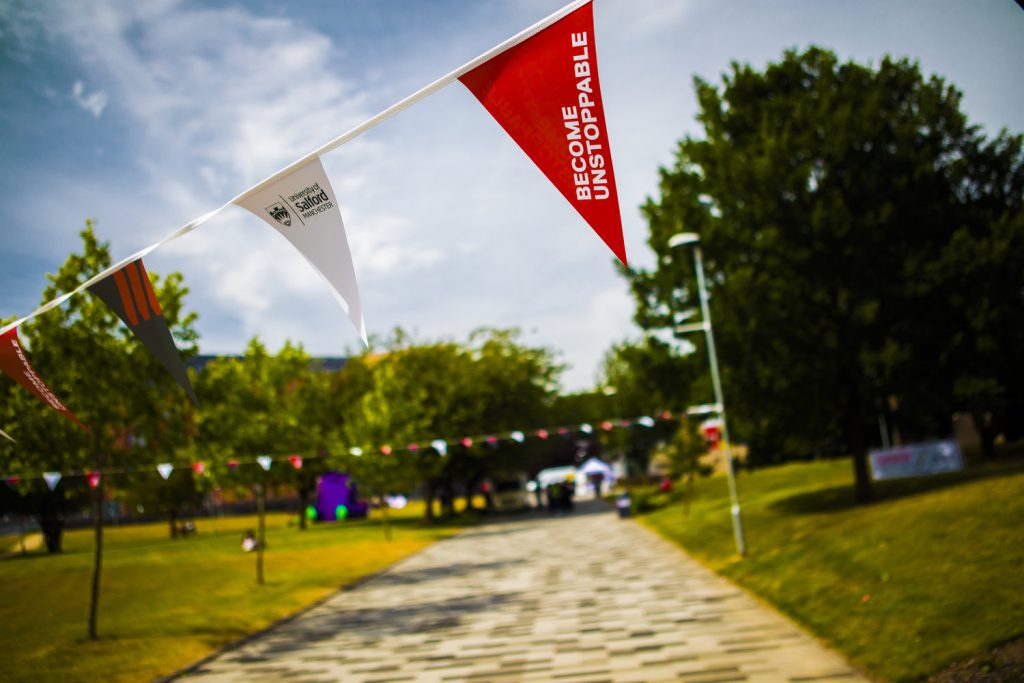
Every year, the University of Salford supports several projects across campus, thanks to the Salford Advantage Fund (SAF). The SAF raises funds from our alumni, friends, and partners to support projects that enhance the student experience, academic developments or the University’s overall environment.
In 2021, we supported five projects through SAF, including Flipping Failure, an initiative which used research-informed approaches to support the wellbeing of our students, staff, alumni, and wider communities.
We caught up with Davina Whitnall, the Researcher Development Manager at Salford who led Research & Innovation’s Flipping Failure project to find out more.
What were the main objectives of Flipping Failure?
We often think of failure as being a negative experience and something to be avoided, ashamed of, and a barrier to achieving success. The Flipping Failure project challenges that misconception and explores the positives and necessities of failure that helps us to build resilience, insight, and inspire action.
After a year of pandemic challenges, we encouraged students, staff, and the public to explore ‘failureship strategies’ and embrace failure as a tool to increase confidence and resilience in these times of uncertainty. The project provided a series of failure focussed and themed events as we examined failure in a range of environments with captivating stories of failure to help navigate everyday life.
Tell us more about the Flipping Failure events.
Over 20 ‘Failure Focussed’ events have been delivered during the spring and summer, with their legacy continuing in the form of videos, user resources, and memorable activities. The events have started to gain national reach, with parallel events taking place at other UK institutions and universities such as Huddersfield, Keel, UCL, and Glasgow joining Salford to ‘Flip Failure’. A total of 40 events were held, with over 700 attendees.
How has the project enhanced the student experience at Salford?
The biggest impact has been on the student perception of failure and the ongoing and embedded approach to this at Salford. There are now regular sessions that address the topic of failure and how to flip this into something more positive; this approach supports and sustains student resilience and has been increasingly important during the period of the pandemic.
When asked, “What did you learn from the sessions?”, one student said:
The importance of understanding failure and identifying how it makes me feel in order to move forward in the most productive way possible; learning now to reframe failure in a positive way rather than letting it put me down; and then learning how I can use that to improve myself and be stronger in the future.
Anonymous
The Failureship approach and flipping failure approach is embedded into the training and development offered to students through the Library and for staff and postgraduate researchers through the Doctoral School. The series of resources continues to grow, and we look forward to adding to this from future events.

What impact has the project had outside of Salford?
The Flipping Failure project has generated national attention and continues to showcase the University of Salford as an authority in this area, with further invitations to deliver training and development in this area, such as speaking at The University of Glasgow’s Women in Computing Science and the Vitae Connections Week 2021.
Other international institutions have adopted the Flipping Failure ethos to support resilience and wellbeing, such as MIT; and the failureship approach is now an ongoing part of the University Festivals and a regular feature on national platforms such as the UK Council for Graduate Education.
The project has also facilitated the expansion of failureship content, a collection of resources in an accessible format to support the Failure Community of Practice, launched at the Economic and Social Research Council‘s Festival of Social Science as a final showcase piece and encouraging a greater adoption of ‘failure’ as a practice across different internal and external communities.
What was the highlight of the project?
The highlight of our programme, facilitated by the SAF, was an inspirational talk from Ruby Wax OBE about her journey through failure and success. She described how a one-time failure ultimately saved and supported her mental health and was the catalyst for her new career. A truly inspirational speaker and likeable person that engaged our audiences with her lived experience of flipping failure!
Were there any challenges?
Yes, but we like to think this is part of the failure ethos! Covid-19 restrictions have meant that some of our original plans have had to be re-thought, scaled-down or done differently. However, we managed to establish a full programme and ‘flipped’ these challenges to encourage conversations about Covid-19 and confidence, further supporting the project aims.
A few words for the donors…
We would like to thank the donors for the unique opportunity and generosity that helped us to realise the Flipping Failure project to support the confidence development, goal setting, and achievement of our students, wider University, and local community. This support has enhanced the learning environment and facilitated positive development, both personally and professionally at this challenging time.
To learn more about the ways you can support innovative projects like Flipping Failure through the Salford Advantage Fund, visit Giving To Salford.
